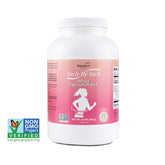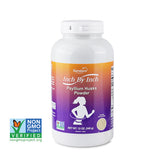Why a Pharmacist Recommends Plant-Based Omega3 Supplements

Maintaining healthy blood circulation is essential for preventing cardiovascular disease, often referred to as the “silent killer.” Pharmacist Jeong-seok Oh emphasizes that consistently taking omega3 supplements, especially during the winter months when the risk of heart-related conditions increases, is a smart preventive measure.
Most omega3 supplements on the market are derived from fish, making them animal-based. However, according to Oh, plant-based omega3s may be more effective in promoting healthy blood circulation and are therefore a better choice.
Hygiene Concerns with Animal-Based Omega3
Fish used for producing animal-based omega3s often come from regions affected by marine pollution and heavy metal contamination. Small fish caught in parts of Central and South America are frequently used as raw materials. A major issue is that these fish are often stored in fishing vessel tanks for weeks—or even years—without proper hygiene measures before being transported to processing facilities in countries like Northern Europe, China, or Canada.
Oh warns that this long and unsanitary storage process can cause oxidation of the raw materials, raising serious concerns about the safety and freshness of animal-based omega3 products for consumers.
The Benefits of Plant-Based Omega3
Plant-based omega3s are generally free from the hygiene issues found in fish-derived supplements. In particular, omega3 derived from microalgae—a type of plant-based plankton at the very bottom of the food chain—is much less likely to be contaminated with heavy metals. It also tends to have a higher concentration of DHA, which is effective in supporting cardiovascular health. Moreover, since the source is not fish, oxidation and spoilage are less of a concern.
Another type of plant-based omega3 is alpha-linolenic acid (ALA), commonly found in seeds and nuts such as flaxseed. However, ALA must be converted into DHA and EPA in the body to be effective, and this conversion rate is only about 2–10%, making it far less efficient. As a result, vegetarians and others who avoid animal products may be at risk of omega3 deficiency.
Oh explains that microalgae-derived omega3 supplements are far more beneficial than ALA from nuts and seeds because they directly provide DHA, which the body can use immediately to improve vascular health.
DHA: The Key Omega3 Fatty Acid
Animal-based omega3s are typically richer in EPA, while plant-based versions—especially those from microalgae—contain higher levels of DHA. While EPA is often linked to improved circulation and DHA to brain health, research shows that DHA also plays a crucial role in cardiovascular health. It helps reduce cholesterol secretion from the liver into the bloodstream and lowers triglyceride levels.
Oh highlights that DHA is actually more essential to the body than EPA, adding, “DHA can be converted into EPA whenever the body needs it. So, if you’re getting enough DHA, there’s no need to supplement with EPA separately.”
Source: 하이닥(https://news.hidoc.co.kr/)
Dailycore-Supercritical rTG Omega3 1000
850mg x 60capsules
$29.99

![Inch By Inch (Psyllium Husks Powder) [Buy 4 Get 1 FREE] - Health Korea Shop](http://healthkoreashop.com/cdn/shop/files/health-korea-shop-default-title-inch-by-inch-psyllium-husks-powder-buy-4-get-1-free-26476880429165_165x.gif?v=1757024963)
![Inch By Inch (Psyllium Husks Powder) [Buy 4 Get 1 FREE] - Health Korea Shop](http://healthkoreashop.com/cdn/shop/files/health-korea-shop-default-title-inch-by-inch-psyllium-husks-powder-buy-4-get-1-free-26471389102189_165x.jpg?v=1757024971)
![Inch By Inch (Whole Psyllium Husks) [Buy 3 Get 1 FREE] - Health Korea Shop](http://healthkoreashop.com/cdn/shop/files/health-korea-shop-default-title-inch-by-inch-whole-psyllium-husks-buy-3-get-1-free-26471348764781_165x.jpg?v=1757024989)

![Inch By Inch (Organic Psyllium Husks Powder) [Buy 3 Get 1 FREE] - Health Korea Shop](http://healthkoreashop.com/cdn/shop/files/health-korea-shop-default-title-inch-by-inch-organic-psyllium-husks-powder-buy-3-get-1-free-26471394771053_165x.jpg?v=1757024965)
![Inch By Inch (Organic Psyllium Husks Powder) [Buy 3 Get 1 FREE] - Health Korea Shop](http://healthkoreashop.com/cdn/shop/files/health-korea-shop-default-title-inch-by-inch-organic-psyllium-husks-powder-buy-3-get-1-free-26471394803821_165x.png?v=1757025003)

